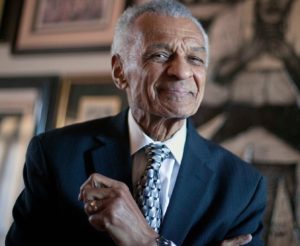

OCEANSIDE, Californian — Sometime in the blistering heat of 1965, while Martin Luther King, Jr. and his allies were marching for the nation’s first inclusive voting rights bill, a wiry, feisty, articulate Baptist minister stood up to the condescending white sheriff of Dallas County—which encompasses Selma, Alabama. Rev. Cordy Tindell Vivian, better known as “C.T.,” was 41 years old at the time, a local pastor gifted with vision, strong loins, and indisputable courage.
The tall, bulky white Sheriff Jim Clark, viscerally racist, stood in the doorway of the county voter registration building and (along with a bevy of his deputies) taunted C.T. Vivian and a crowd of blacks who—nonviolently and peacefully—demanded the right to enter and register. Of some 15,000 African Americans living in Dallas County at the time, only about 300 were catalogued with the most basic democratic entitlement—the ballot.
The scene was captured for posterity by an alert television news crew. Rev. Vivian, a good-looking, forceful man with a strong instinct for history, demanded that he and his friends be allowed to enter the building and sign up to vote. He spoke directly and compellingly to the uniformed man wearing a gun and holding a nightstick. The officer pushed C.T. back; the preacher came back and continued to demand access in the name of the Constitution and humanity. C.T. Vivian was abruptly clubbed across the face and began to bleed but that did not prevent him from remaining at full height and vehemence until the rally was brutally dispersed.
This was but one moment in an episodic, history-bending lifetime for this now departed man; there were lunch-counter sit-ins he led as part of the “Nashville Movement,” perilous Freedom Rides, and the dangerous and daunting march from Selma to Montgomery that began with “Bloody Sunday.” But the grainy clip of C.T. Vivian confronting the sheriff at the voting booth center became and remains iconic. It is featured in the award-winning Eyes on the Prize documentary miniseries.
In 2011, while attending the 20th Anniversary celebration of the National Civil Rights Museum at the Lorraine Motel in Memphis, I bumped into Rev. C.T. Vivian. He was one of the honorees that included Rev. James Lawson, Cicely Tyson, Bill Russell, and Usher. Convivial, hearty, still so handsome, he reached out to me unreservedly and without affect. (Some of the honorees were a bit smitten with themselves, their real achievements notwithstanding). I took the liberty of offering condolences on his recent loss of his wife of many decades, Octavia, of blessed memory.
C.T. took my hands and broke into tears. “You have no idea how much it hurt, to have found her dead in our home,” said the sweet pastor. He then told me of his strong feeling that “clergy need other clergy to talk about our own pain.” He instantly became not a hagiographic figure but just a colleague in the business of human life. We exchanged phone numbers and promised to keep in touch.
Rev. Vivian gave of his very blood and flesh, endured jarring blows and prison stays, to make it possible for all Americans to have the ballot—in other words, to share in what we take for granted as a model democracy. Due to his selfless efforts, and his willingness to directly confront—and be beaten by Southern police brutes and KKK cowards—the 1965 Voting Rights Act signed by President Lyndon B. Johnson was further enabled.
“C.T.,” who lived 95 years, was not a large man, physically. His largeness was in his incredible humility. Unlike some of the other immediate associates of Dr. King, he did not seek nor covet King’s fame and celebrity. He just craved freedom; his unyielding conviction was about the fact that one hundred years+ after the Emancipation Proclamation, people in Alabama, Mississippi, Louisiana, and Georgia were systematically being denied access to the voting booths—by state laws, craven qualification tests that did not apply to white people, and just plain ugly racism.
In Washington not so long ago, sitting and schmoozing with Rev. Vivian and other such freedom icons, listening to their anecdotes about King and of days that readjusted America’s moral compass, and lamenting together about the current incendiary relapse into racism and hatred that is poisoning our country, I thanked God in my heart that our nation still remembers the men and women who simply said, “No more!”
Let the work and wounds of Rev. C.T. Vivian not be in vain. Now more than ever.
*
Ben Kamin is a writer and lecturer on the life of the Rev. Martin Luther King Jr. He is a resident of Oceanside, California.